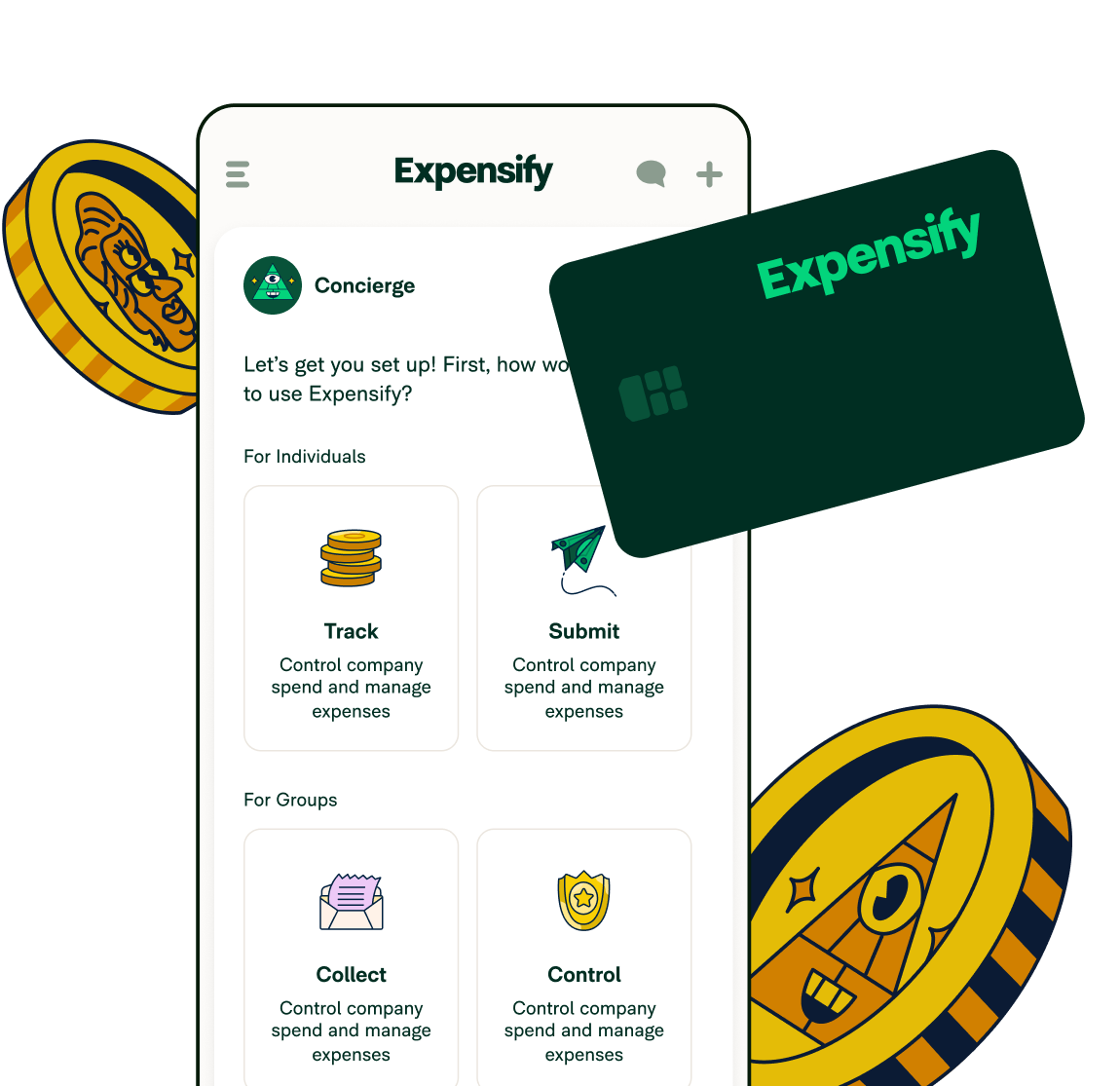6 alternatives to Quickbooks that make accounting a breeze

Small businesses handle everything from inventory to payroll, and accounting software needs vary wildly between a freelance designer and a retail chain.
While QuickBooks dominates the market, and we have thousands of mutual customers with them, we understand that smart business owners might want to explore other programs like QuickBooks to find the perfect fit for their specific needs.
Here's what you need to know about six top QuickBooks alternatives that could transform how you handle your books.
Key takeaways
- Every business has unique accounting needs, and different software excels in different areas: A retail business needs inventory management while a consultant prioritizes expense tracking
- Small businesses often rely on multiple financial tools to meet their diverse operational needs, combining accounting software with specialized expense tracking, payroll, and reporting solutions
- Expensify integrates with QuickBooks and most major alternatives, ensuring smooth expense management regardless of your accounting software choice
- Having multiple quality options means businesses can find software perfectly tailored to their specific industry and workflow rather than settling for a one-size-fits-all solution
- Evaluate alternatives based on your specific business size, industry requirements, and integration needs before making any decisions – the best alternative to QuickBooks varies by business type
The top six QuickBooks alternatives for small business
Each of these accounting software options similar to QuickBooks brings something different to the table. Here's how they stack up:
| Software | Best for | Starting price | Key strengths | Expensify integration | Free trial |
|---|---|---|---|---|---|
| Xero | Mid-sized teams with multiple users | $13/month | Unlimited users, strong reporting, excellent third-party integrations | ✅ Full integration | 30 days |
| Sage Business Cloud | Growing businesses needing detailed reporting | $25/month | Advanced reporting, multi-currency support, scalable features | ✅ Sage Intacct integration | 30 days |
| FreeAgent | UK-based small businesses and freelancers | £12/month | Automated VAT calculations, HMRC compliance, project tracking | ❌ Not currently | 30 days |
| ZipBooks | Teams working closely with accountants | Free plan available | Accountant collaboration tools, time tracking, smart insights | ❌ Not currently | Forever free plan |
| OneUp | Retail businesses with inventory | $9/month | Point-of-sale integration, inventory management, e-commerce sync | ❌ Not currently | 30 days |
| Tiller | Tech-savvy users who love spreadsheets | $6.58/month | Google Sheets integration, automated data feeds, customizable templates | ❌ Not currently | 30 days |
Xero: Built for team collaboration
Strong collaboration features: Xero shines when multiple team members need access to financial data. Unlike QuickBooks which charges per user, Xero includes unlimited users on all plans.
Excellent app ecosystem: With over 1,000 integrations, Xero connects to almost every business tool you can imagine. The platform was built with third-party connections in mind – like its integration with Expensify!
Robust reporting: Generate detailed financial reports with customizable templates that make presenting to stakeholders easy.
Sage Business Cloud: Enterprise power for small business
Advanced features without the price tag: Sage brings enterprise-level reporting and multi-entity management typically found in expensive software.
Multi-currency support: Perfect for businesses that work internationally or handle transactions in multiple currencies.
Scalability: Grows with your business from startup to enterprise without forcing you to switch platforms. And, did we mention it integrates with Expensify?
FreeAgent: UK businesses get special treatment
Tax compliance made simple: Built specifically for UK businesses with automatic VAT calculations and HMRC integration.
Project profitability tracking: See exactly which clients and projects generate the most profit with built-in time tracking and project accounting.
Automated expense categorization: Smart algorithms learn from your patterns to categorize expenses automatically.
ZipBooks: Your accountant's favorite platform
Seamless professional collaboration: Share access with your accountant or bookkeeper without the usual back-and-forth of file sharing.
Time tracking integration: Track billable hours directly in the platform and automatically convert them to invoices.
Smart financial insights: Get actionable advice about cash flow and business performance without needing an accounting degree.
OneUp: Retail and inventory specialists
Built for product-based businesses: Designed specifically for businesses that sell physical products, with features other accounting software often misses.
E-commerce integration: Syncs directly with Shopify, WooCommerce, and other online stores to automatically import sales data.
Multi-location inventory: Track stock across multiple warehouses or retail locations from one dashboard.
Tiller: Spreadsheet lovers, this one's for you
Unlimited customization power: Uses Google Sheets or Excel as the interface, giving you complete control over your financial setup.
Automated data feeds: Connects to your bank accounts and credit cards to automatically pull transaction data into your spreadsheet.
One-time setup: After initial configuration, your financial data updates automatically without monthly subscription complexity.
Honorable mentions
While the six alternatives above represent the strongest QuickBooks competitors, two other platforms deserve recognition.
Wave: Perfect for freelancers and very small businesses, Wave offers completely free accounting software with paid add-ons for payroll and payments. The interface is clean and simple, though it lacks some advanced features larger businesses need.
Zoho Books: Part of Zoho's comprehensive business suite, this accounting software shines when you're already using other Zoho products. It offers solid invoicing, expense tracking, and project management at competitive pricing, though it can feel overwhelming if you only need basic accounting features.
Key factors to consider when choosing accounting software
Finding the right QuickBooks Desktop or QBO alternative depends on understanding your specific business needs. Here's what matters most:
Business size and complexity: A solo consultant has vastly different needs than a 50-person manufacturing company. Don't pay for features you'll never use, but ensure the software can grow with you. Many small businesses find they need to upgrade or change accounting software as they grow and their needs become more complex.
Industry-specific requirements: Retail businesses need inventory management, service companies need time tracking, and nonprofits need fund accounting. Generic software often creates more work. When exploring accounting software other than QuickBooks, prioritize platforms that understand your industry's unique needs.
Budget constraints: Factor in the total cost including setup, training, and monthly fees. Free options like ZipBooks exist, but evaluate whether missing features will cost you more in lost efficiency than paid alternatives would cost in monthly fees.
Must-have features and integrations: Start with your non-negotiables. If you use specific tools for payroll, e-commerce, or project management, ensure your accounting software integrates seamlessly with them. Switching between disconnected systems wastes time and creates errors.
Additional considerations for accounting software selection
Beyond the basic features, several factors can make or break your experience with new accounting software:
User interface and ease of use: If your team struggles with the interface, even powerful features become useless. Look for clean, intuitive designs that don't require extensive training.
Mobile capabilities: With many businesses on-the-go these days, you need access to financial data from anywhere. Ensure the software offers full mobile functionality, not just basic viewing.
Customer reviews and support: Research real user experiences on platforms like G2 or Capterra. Pay attention to how the company handles customer service issues and whether they provide adequate training resources. This research is especially important when evaluating any alternative to QuickBooks for small business to ensure you're getting reliable support.
Data security and compliance: Your financial data needs enterprise-level protection. Verify that any software you consider meets industry security standards and compliance requirements for your business type.
Trial period strategy: Take advantage of free trials, but use them strategically. Set up realistic test scenarios that mirror your actual business processes rather than just clicking around the interface.
How Expensify integrates with QuickBooks alternatives
No matter which accounting software you choose, expense management remains a critical piece of your financial workflow. Expensify handles this seamlessly across multiple platforms.
Realtime syncing: When you snap a photo of a receipt with Expensify's mobile app, that expense automatically flows into your accounting software without manual data entry.
Two-way integration: Changes made in either system sync automatically, keeping your books accurate without duplicate work.
Smart categorization: Expensify learns your expense patterns and automatically categorizes transactions to match your accounting software's chart of accounts.
Why this matters for your business
Whether you're using QuickBooks, Xero, or Sage Intacct, Expensify eliminates the manual work of expense tracking. Employees submit expenses in seconds, managers approve with one click, and everything flows into your accounting system automatically.
Especially for small businesses, this integration saves hours every week that you can spend growing your business instead of pushing paper.
👉 See Expensify in real life: Learn how Buffer uses Expensify to integration with Xero and how they’ve streamlined global payments for their team across multiple countries.

“Expensify simplified tracking receipts and streamlining reimbursements across our team. It is customizable for the needs of every kind of team!”
Finding your perfect accounting software match
Choosing accounting software isn't about finding the "best" option. It's about finding the right fit for your specific business.
QuickBooks works great for many companies, but this QuickBooks alternative small business guide shows that Xero might be better for collaborative teams, Sage could be perfect for growing businesses with complex reporting needs, and FreeAgent might be ideal for UK-based freelancers.
The key is being honest about your current needs while planning for growth. Don't overcomplicate things by choosing enterprise-level software when you're a solopreneur, but also don't paint yourself into a corner with overly simple tools if you're scaling quickly.
Most importantly, remember that your accounting software should work with your other business tools, not against them. Whether you choose QuickBooks or one of these alternatives, ensure your expense management integrates smoothly to keep your financial workflow running like clockwork.
FAQs about alternatives to QuickBooks
-
Yes, Expensify has a robust QuickBooks integration that syncs expense data automatically. Whether you're using QuickBooks Online or QuickBooks Desktop, expenses flow directly into your accounting system without manual data entry, and the integration supports realtime syncing for accurate financial records.
-
Yes. Xero represents QuickBooks' strongest competition with comparable features, better collaboration tools, and often lower total costs for growing teams. Sage Intacct also competes directly, especially for businesses that need advanced reporting capabilities.
-
Google doesn't offer dedicated accounting software, but Tiller transforms Google Sheets into a powerful accounting system. For simple bookkeeping, Google Sheets can handle basic tracking, but most businesses need dedicated accounting software as they grow.
-
Xero consistently ranks as the top alternative, offering unlimited users, robust features, and excellent integrations at competitive pricing. However, the "best" choice depends entirely on your specific industry and business needs.
-
Common reasons include pricing increases, particularly for multiple users, limited customization options, and integration challenges with modern business tools. Some businesses also find QuickBooks either too complex for simple needs or too basic for growing companies.
-
ZipBooks offers a permanently free plan with basic invoicing and expense tracking. Tiller provides the most affordable option at under $7 monthly. However, free options often lack advanced features like payroll integration or detailed reporting.
-
Xero holds the strongest competitive position globally, while Sage dominates in specific markets like construction and manufacturing. FreshBooks and Wave also compete in the small business space, each with unique strengths.
-
Not necessarily. Your accounting software choice should match your business complexity, team size, and industry requirements. Many successful businesses use alternatives that better fit their specific needs and workflows.







